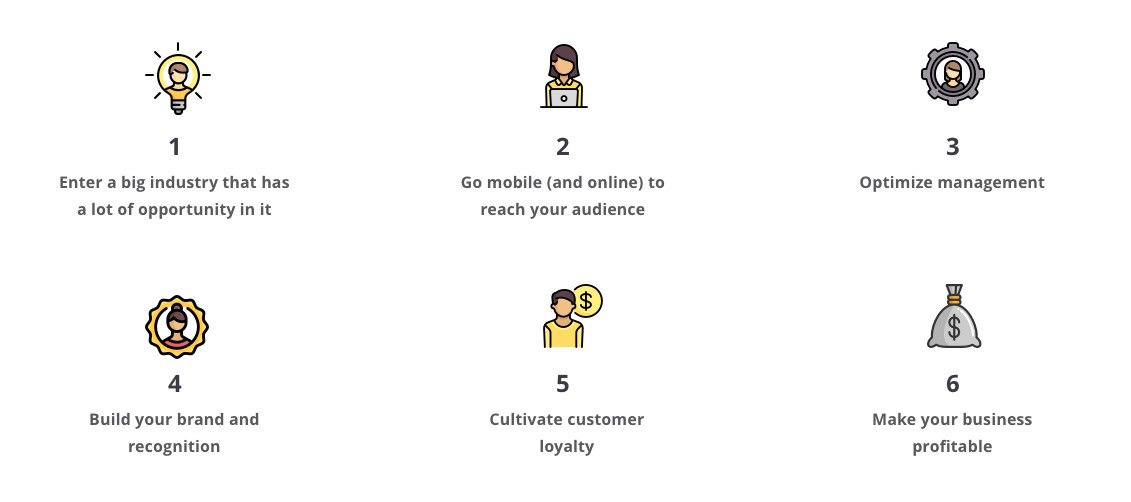The transportation industry is a dynamic ecosystem whose trends strongly suggest that every ride-hailing business now should go and get its own taxi-booking mobile app. The demand for and interest in mobile app development for businesses in the tertiary sector of the economy are some valid reasons to take up this suggestion and invest in taxi app development. Although our age of mobility has already brought immense changes there, a chain reaction they have set off is promising further transformations.
When it comes to delivering on-demand transportation services, it will be no exaggeration to say that digitalization in the industry is a process most of us embrace and even take for granted. We all must admit that a phone-based dispatch system is gradually getting outdated as a mediator between customers and service providers. In turn, Transportation Network Companies (TNCs) like Lyft, Uber, and Gett have proved it possible to hail a cab without going outside or speaking to taxi operators. They allow booking and paying in one click for any trip with the help of a smartphone and people are getting used to this new reality rather quickly.
It all sounds alluring, right? Yet, it is fine to still lack confidence that will encourage you to take concrete steps toward a dynamic change of your local urban landscape and transportation infrastructure for the better. That being the case, we are ready to accept the challenge and dispel any concerns you have about investing in taxi app development.
Benefits of a taxi booking app for businesses
If you have an idea or fleet vehicles (or maybe both), we have some good news for you. For those still in doubt, there are six benefits your company can derive investing in taxi booking mobile app development. Furthermore, each point is here to give you a push and contribute to formulating an informative answer to the why question:
1. Enter a big industry that has a lot of opportunity in it.
When encouraging you to start looking for taxi app development solutions, we are not talking about traditional taxi cabs. Instead, we want to highlight a new shape the on-demand transportation industry is already taking. So, what we really mean by “taxi app development” is an opportunity for TNCs to operate ride-hailing services via mobile applications.
Travelers and commuters are only getting used to the idea that their smartphones can let them save time and money providing convenience and quality service, anyway. Yet, new technologies are in the early stages of changing customer behavior, which makes much room for collaboration, just as it does for competition. Consequently, although the industry has been modernized, barriers to entry are still not extremely high as some entrepreneurs might think. Small and midsize businesses are very welcome.
Moreover, due to growing congestion and pollution, ambitious on-demand mobility programs are being developed worldwide, so that personal cars will get unnecessary in the future. These programs offer transportation alternatives to traditional mobility solutions. As a result, e-hailing services are expected to replace taxicabs while the end goal of this process is the improvement of mobility services meant to make transportation convenient for the customers and more efficient for all parties involved.
However, this overall uncertainty in the market creates equally perfect conditions for all industry players. Now, each of them can benefit from the emerging new-mobility economy. So, why not enter the market today fully armed with the insights?
2. Go mobile (and online) to reach your audience!
Going mobile is the present and the future of transporting. What we believe to be outdated has, as a rule, nothing to do with the online presence. The statistics, however, is going even further to show that the Internet is now reported to be accessed more often from mobile devices (51,2%) than from desktop computers (48,7%.) Those who have not thought seriously about a mobile-first approach should definitely have a second thought.
This is particularly so for on-demand transportation services. People require a strong mobile presence in order to access the service using online taxi apps on their mobile devices at any time they need a ride.
3. Optimize management.
A transition from a traditional phone-based dispatch system to a modern mobility-on-demand urban transportation system involves changes in management. First of all, when opting for taxi app development, your web-based real-time service will have to consist of several parts. These parts are apps for drivers and apps for passengers that will work on devices running iOS and Android and an admin panel. The panel is meant to contribute to better management. Not only are administrators responsible for connecting drivers and fares, which is traditionally the job of phone operators, but also they access all the relevant data on payments, confirmed/canceled rides and user account information. A business works more efficiently when everything is under control. So, gathering data in one place and entrusting responsible and attentive administrators with monitoring you are bound to boost business productivity.

4. Build your brand and recognition.
A cab-booking app shortens the distance between drivers and passengers. At the same time, however, the very fact that your app can be downloaded by anyone brings you as a brand and your present or future customers together. Don’t you worry! There is no need to invest lots of money at once. We understand that trying to make a statement in a rather competitive field right upon entering it resembles overreaching oneself. You can start by developing white-label software spending a reasonable amount of money on it. Then, when this blank billboard sign is ready, you are free to choose what to write on it to make it recognizable. As a reminder, it is to your interest that your product has features that users will love and that it looks attractive enough for them (therefore, it cannot hurt to go through a discovery phase.)
5. Cultivate customer loyalty.
Your reputation means a lot even though getting a good one may be challenging. To do that, a taxicab company or a TNC should develop its own mobile application focusing on customers needs. A true and sincere connection with them will turn passers-by into regular customers dedicated to your service. Having a well-established feedback system implies that everybody who uses or manages an application is fully informed: drivers and passengers can share their experience and the company can respond to reviews keeping customers and service-providers up to date. Chances are this approach will result in trust-based relationships and loyalty.
6. Make your business profitable.
TNCs that operate mobile platforms matching drivers and passengers probably do it with a view to gaining a profit. Naturally, a company produces more net income if it ensures that there is a steady increase in the number of rides. Accordingly, your investment in app development will not be made in vain for it may help decrease your expenses and bring about higher revenue. With an app, it is easier to save on commissions that are usually paid to taxi aggregators and let more people know about you. However, high revenue does not always mean net income growth. Drivers demand and passengers supply must be balanced so that the company could be not only high-revenue but also profitable. To begin with, a TNC needs a sufficient driver pool. A system of bonuses and incentives will help create and maintain one. Then, you are absolutely free to make an app equally attractive to passengers and start increasing your net profit.
Benefits of a taxi booking app for passengers and drivers
Benefits that a cab booking app can offer to business owners are aplenty. Nevertheless, there are three pillars of your application’s success and only building those, you will be able to come up with the best taxi app:
1. A feedback system.
That’s right, it works both ways. Openness and fairness will inspire trust and loyalty of customers and drivers, which is great for businesses. On the other hand, they can boost the quality of services provided, which is good for users.

2. An increase in driver’s earnings.
The equilibrium of supply and demand is important for the prosperity of any sector of the economy. When it is achieved in the on-demand transportation field, drivers do not sit idle. In the context of a traditional mobility system, this balance is more difficult to maintain. But when a company relies on an app, everybody within the system is better informed, which allows drivers to cover more miles and complete more rides a day.
3. The quickest and cheapest way to get from point A to point B.
This is exactly what ride-hailing has once been launched for. Why don’t you make your own contribution to a new advanced mobility system and invest in taxi app development to make the transportation future better for everyone?
Conclusion
Now that you have got a clearer view of the numerous benefits your business can derive upon investing in its own mobile app development, what are you going to start with?
If our arguments sound convincing enough and you feel more confident now about promoting your ride-hailing business, we advise you to act confident, too. As an option, you can hire an app development agency that will deliver quality taxi app development outsourcing services. Our experts are ready to guide you through each stage of the design and building process.

© 2019, Vilmate LLC




